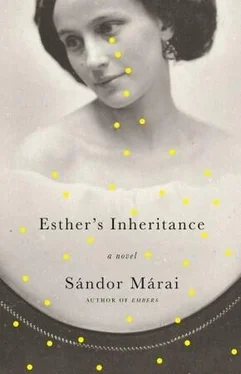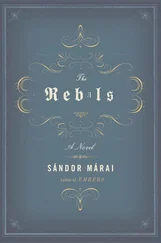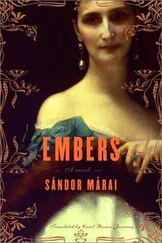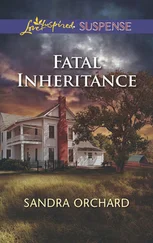He rarely wrote while traveling abroad; at most he sent postcards. By that time he was putting on an act again; this time was “one of the turning points” of his life, a decisive moment he had to seize with both hands in a grand gesture: he had to be dressed to perfection for the part. The proper dress was mourning wear, the decisive moment the journey abroad. He set out like one who could not bear the pain, who had to escape his memories.
I think the truth was that he had a marvelous time amusing himself in those foreign cities, establishing business contacts—“burying himself in work,” as he put it — in other words, going to the occasional museum or library and spending the rest of the time sitting around in cafés and restaurants, his contacts mainly sentimental. The soul of Lajos is made of flexible stuff, I thought. But in the months I waited for him I realized that I could not live with him, that something was missing in him, in his spirit, in his very being, some bonding agent without which you cannot form human relationships. His tears were real tears, but they did not dissolve anything in him, no memory, no pain: Lajos was always fully committed to delight or melancholy but actually felt nothing at all. There was something inhuman in all this. When he returned a few months later I did not wait for him but went home a few days before, leaving the children in the care of a dependable woman, writing Lajos a letter in which I said I did not want the role of pretend-mother, I wanted to know nothing about him and never wished to see him again. I received no answer to this letter. In the first few weeks — well, the first few years — I was waiting for him to answer, but later I understood that he could not answer, that the world in which we had lived together had crumbled away. After that I expected nothing from him.
Now when Éva was speaking of these unknown letters in such passionate and accusing tones, I suddenly remembered the rosewood box. The box was in fact mine, a present from Lajos for my sixteenth birthday, but Vilma had asked me for it. I was not happy giving it up. I didn’t know Lajos properly then, and was not truly aware of my feelings for him. Vilma begged me for the box, and in the end I surrendered it, reluctantly but without putting up much resistance; I must have gotten bored with her pleading. Vilma was always asking me for my things, anything I had been given: clothes, books, musical scores, anything at all she thought might be treasured or of value to me. That’s how she got the rosewood box. I protested for a while, then grew tired and gave in; I had to give it to her because she was simply stronger. Later, once I suspected that there might be something between Lajos and me, I begged in desperation to have the box back, but Vilma lied that she had lost it. This box, inlaid with rosewood, made of plywood and veneer, scented with spices with a slightly choking smell, lined in red silk, was the only gift I ever received from Lajos. I never considered the ring a real present. The box vanished from my life. Then there it was again, decades later, in Éva’s story, with these strange contents, the three letters from Lajos before his marriage, begging me to elope with him, to save him. I put the picture back where it was.
“What do you people want from me?” I asked, and leaned against the sideboard.
“L ook, Esther,” she said, a little confused now, and lit another cigarette. “Father will tell you everything. I think he’s right. You may think a great deal has happened since you left us, and indeed a great deal has happened, not always for the best. I don’t remember the earliest days. Then we went to school and life became exciting. We moved apartments yearly, not just apartments but schools and nannies too. Those nannies…my god…as you can imagine Father was none too choosy. Most of them ran off, taking a few of our possessions with them, or it was we who ran off, leaving home and furniture behind; we went from one rented apartment to another. One time, when I would have been about twelve years old, we were living in hotel rooms. It was such an interesting life. The headwaiter dressed us, we shared lessons with the elevator boy, and when Father disappeared for a few days the chambermaids would look after us and see to our education. There were times when we ate sea crab day after day and other times when we hardly ate anything. Father is very fond of crab. That was our upbringing. Other children are brought up on sour milk or vitamins…But we generally had a good time. Only later, when Father’s fortunes were on the rise and we reverted to respectable middle-class life, renting an apartment, managing a household, when Father set out on some new venture — and even as a child I trembled at Father’s ventures — we occasionally wept to remember our hotel days, because even in our “respectable life” we were living like nomads in a desert. Father is not really an urban creature, you know. No, don’t protest, I think I might know him better than you do. There is nothing of the materialist in Father, possessions mean nothing to him, he doesn’t even mind whether he has a roof over his head or not. There is something in him of the hunter-gatherer, who rises in the morning, gets on his horse — he always kept a car even at the worst of times, usually driving it himself — and sets out into his own patch of savannah or forest, which in Father’s case was the city, sniffs the air, stays on the alert, hunts down a suitably large banknote, roasts it, and offers everyone a bite; but then, while there is anything left of the prize, for days or even weeks on end, he is not interested in anything else…And, when it comes down to it, this is what we love in Father, and what you too love, Esther. Father is capable of discarding a piano or a decent job the way other people throw away used gloves; he has no respect for objects and market value, you know. This is something we, as women, cannot understand…I have learned a great deal from Father, but his real secret — his carelessness, his inner detachment — I cannot learn. He does not feel closely bound to anything, the only thing he’s interested in is danger, life being the most peculiar danger…God alone knows, God alone can understand this…He needs this danger, this life among people but without human ties; he breaks ties out of curiosity and absentmindedly throws them away. Did you not realize this when…? I mean, did you not feel it? Even as a child I felt we were meant to live in a tent, a migrant tribe traveling through country that was sometimes dangerous, sometimes pleasant, Father with bow and quiver in his hand going ahead, spying out the terrain, dashing to telephones, listening, watching certain signs, then suddenly full of energy, fully alert, and tensed for action…elephants approaching the drinking pool, Father in his covert raising the bow. Are you laughing at me?”
“No,” I replied, my throat dry. “Carry on. I won’t laugh.”
“Men, you know,” she said in a wise pedagogic manner with a light sigh.
I did laugh. But I immediately grew serious again. I couldn’t help but notice that Éva, Vilma’s daughter, this child with whom I had lightheartedly adopted an adult, grown-up-woman tone, knew something about men, certainly something more and more certainly than I did, I who could have been her mother. I scolded myself for laughing.
“Yes, yes,” she said innocently, and opened her big blue eyes to indicate her seriousness. “Men. There are such men, men unbound by family, possessions, or territory. They would have been hunters or fishermen in the past. Sometimes Father was away for months and then we were educated in institutions run by nuns who were good-natured if a little scared but who tried to keep us in order in much the same way as if they had found us abandoned by the roadside, as if bits of the jungle were still sticking to our hair, as if we had spent our time dining with monkeys off trees bearing loaves of bread. You see, that is the kind of colorful childhood we enjoyed…Not that I’m complaining. Please don’t think I am complaining about Father. I love him, and I think he was nicest to me when he returned from one of his longer excursions a little exhausted, utterly broke, looking as if he had been fighting wild animals. It was really good at such times, for a while at least. On Sunday mornings he would take us to the museum and then to the sweetshop and the cinema. He would ask to look at our exercise books, clip on his monocle, and would chide and teach us with a solemn frown…It was all most amusing, Father as schoolmaster, can you imagine?”
Читать дальше












